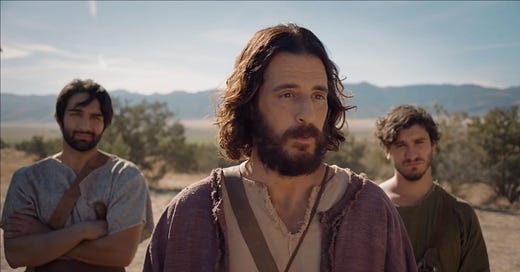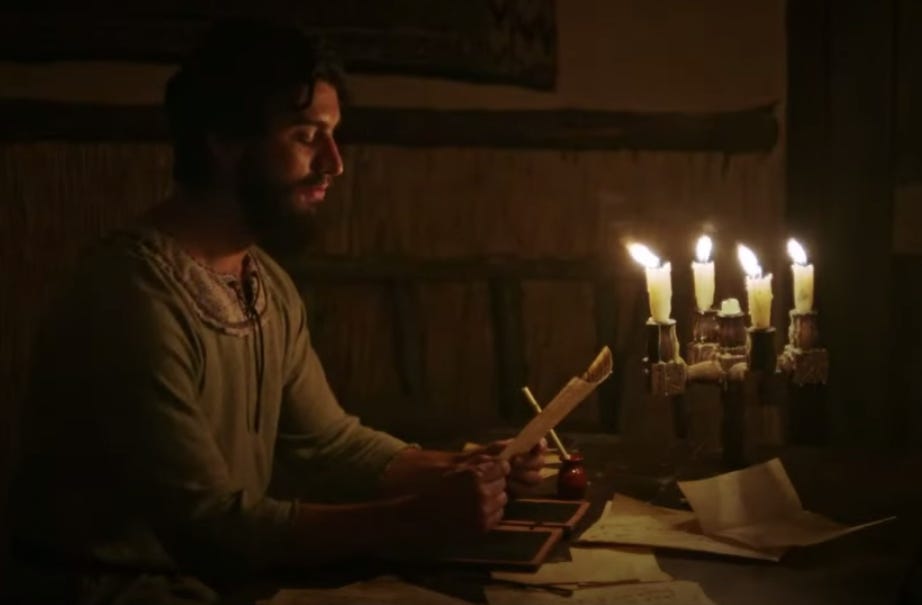Summary
We open with John the Apostle listening to each of the disciples telling their stories about the first time they came to encounter Jesus. Initially we know that this is occurring some years into the future as everyone has aged. We get some wonderful Easter eggs in the form of Bible passages being recounted. The final interviewee is the Blessed Mother, and we confirm that John is the one collecting these notes. Mary is a little saddened by John’s disposition. She reveals that all of the apostles have come together because they are grieving the death of Big James, John’s brother. Mary says, “You know if you tried to write down all of what he did, the world itself could not contain all the books.” Mary and John then discuss where John will begin his Gospel. He says he thinks he should start, “In the beginning…” at this statement a loud thunder crack rings out.
James and John are plowing a field and despite the hard work they are very happy they are not with the Samaritans. We jump to Thomas and Ramah on the road trying to find their way to the Sychar with Ramah’s father. We get a very brief encounter proving that they are not in friendly territory as Jews. Meanwhile in Sychar, the disciples are speaking about Jesus’s ministry in the city. We learn that the citizens of the city are turning out in very large numbers to hear him preach. When they go to inform Jesus that the people are ready to hear more, they cannot find him. They begin a city-wide search for Jesus.
We cut away from the search to find Jesus under a cart fixing the axle. While everyone continues to search, Thomas arrives and meets Matthew and Mary. Ramah’s father, Kafni, wants to speak with Jesus and is clearly irritated by the entire trip. Next, we hear a sermon where Jesus uses a shepherd searching for a lost sheep to explain how God views the return of a sinner. As night falls, we see a man with a broken leg walk out to the field James and John plowed. When Jesus returns, he asks Kafni to wait until morning to speak.
Come morning, we see John and Big James acting as leaders of the group as they are put in charge of Jesus’s plans and are praised for their good work the previous day. They give tasks to the others to prepare for a feast that night. When Jesus and Kafni finally speak, he disapproves of Jesus’s mission but doesn’t forbid Ramah from staying as she seeks to become a disciple alongside Thomas. Jesus praises Big James and John again for their work, and they learn that rather than dining with the important people from the city, the group will feast with the crippled man on the edge of town. During their meal, we learn that he broke his leg after falling from a horse that was stolen from a Jew he helped rob and beat. He is ashamed of his actions and feels terrible for the generosity Jesus has shown him after his evil actions. Jesus assures Melech the Jew he attacked didn’t die and tells him he is lost sheep that Jesus has come to save. Jesus then makes a “too soon” joke. (I love this humor!)
In the morning, Melech’s leg is healed and Jesus smiles as he arises in bed and tells James and John that they will be able to perform greater miracles than that someday. The disciples bicker about the plans for Jesus that day. James and John pursue Jesus and, in the process, come across Samaritans who revile them because they are Jews. John and James call for Jesus to give them the command to destroy them. Jesus reveals that they have missed the point of the ministry already. He has come for all and his message is being received. Jesus gives the brothers the title of Sons of Thunder.
Jesus is invited to teach in the synagogue and calls John in to help select the reading. Eventually John says he likes the beginning when God spoke the world into existence. Jesus agrees and reads the creation story while we see John composing the beginning of his Gospel. As John concludes his opening, lightning and thunderclaps close out the episode.
Megan’s Insight
We first met Thomas and Ramah in The Chosen at the wedding in Cana. Now they have joined the other disciples to follow Jesus and participate in His ministry. I think the addition of Ramah as part of Thomas’s story and the dialogue between Thomas and her father add unique depth and perspective to his character. Our son Thomas Jozef Magnus was born last week so to celebrate, I want to reflect on the story of Thomas.
Most of us immediately think of the Apostle Thomas as “Doubting Thomas”. The Bible and scholars tell us he was among the last, possibly the very last, of the disciples to reconvene following the Crucifixion of Jesus. Of course, Mary Magdalene, John, and Peter had seen the empty tomb, and later Jesus visited the disciples, but Thomas was not there, and he missed it. When told about the miracle, a grieving Thomas doubted the story. There are two important things to note when reviewing Thomas’s story. First, he heard the story from his fellow disciples, his fellow man. He listened to their words and allowed himself to forget the words of Jesus, which already told Thomas that Jesus would die and return from the dead. How often do we let the words of our fellow man, both good and bad, get in the way of what Jesus has told us?
The second thing to remember about Thomas, and probably more important, was that Jesus picked him as one of His disciples. Jesus made this choice knowing full well that Thomas would be overcome by doubt. However, Jesus also knew that Thomas would overcome this doubt, and as a result, would be even more fervent in bringing others to believe. There is a reason why St. Thomas is the patron saint against doubt. Jesus picked Thomas not because he would doubt, but because he would come back. In so doing, Thomas is the example for all of us who ever doubt our God, our faith, or even our place in God’s plan.
Mitchell’s Insight
John has quite the rollercoaster of an episode. He works hard and is put forward as an example by Jesus that others should follow. He puffs out his chest until he learns that he plowed the field of a Samaritan, a Samaritan that nearly beat a Jew to death. When he awakes the next morning, he is then told that he will be given powers greater than healing a broken leg in his sleep. He quickly asks to use those powers to burn up Jesus’s enemies because they spit at him. Lastly, he is called in to help select Jesus’s scripture for the reading in synagogue. Talk about your highs and lows!
When asked for his opinion, John tells Jesus he can’t give his opinion because he is unworthy after his behavior the last two days. Jesus does not correct John but instead asks, “Who is worthy of anything?” John says that Jesus is worthy but him alone. Once again, John is correct, but he adds one error to the end of his response because he says no man is worthy. This leads to two lines from Jesus.
“I’m a man, John.”
“I AM WHO I AM.”
These two lines back-to-back are remarkable. I AM WHO I AM has come down to Earth and taken the flesh of a man. These two lines summarize the Incarnation in just eight words. The Divine Title is a call back to the Old Testament when Moses was speaking to God at the burning bush. The other line is a non-biblical statement where Jesus confirms the Incarnation. John is standing shoulder to shoulder with the Eternal Creator of the Universe. John is looking upon the face of God. (Remember Shmuel said God cannot have a face.) You see, John is right that he isn’t worthy. None of the followers of Jesus are worthy. John is also right that Jesus is worthy. But, John goes too far because a man is worthy. Jesus, the God-man, is worthy.
John is completely in awe of these two statements. He finally makes a recommendation to read “the beginning.” They quote David in the Psalms, and John points out that Greeks use “word” to describe divine reason. Jesus approves of John’s selection and says, “I like that, and it is a favorite memory.” (One of my favorite lines from the show.)
The Mystery of the Incarnation is a beautiful tenant of the Christian faith. Docetism, Apollinarianism, Adoptionism, Arianism, Nestorianism, Monophysitism, and Monothelitism are not just a list of $100 words that will make you sound really smart if you can pronounce them and know their meanings, but they all are names for beliefs that tried to deny what we see John learn/understand in this episode. These beliefs denied the Incarnation is some way. The existence of all of these false beliefs demonstrates just how incredible the Incarnation of Jesus is, but the bottom line is the second person of the Blessed Trinity brought forth everything that has ever existed and became walked on two legs across Palestine, Syria, and Samaria. What an amazing God!
Michael’s Insight
“In this world, bones will still break, hearts will still break, but in the end the light will overcome darkness.” This is Jesus’ response to Melech’s wife when she asks Him when He will put an end to pain and suffering. In The Lord of the Rings, J.R.R. Tolkien refers to the fight against evil as “fighting the long defeat.” He used the phrase to describe how no matter how long we do battle with evil, evil will continue to plague this world.
Some Jews in the first century would have had a literal interpretation of the Messiah. He would be a powerful warrior king who would overthrow the Romans and bring peace to the world. He would heal all injury and put an end to physical and emotional suffering. In this scene, Jesus illustrates to Melech and his family that the healing will not take place in this life. Heaven is where we will find peace, and Jesus is here to provide us the opportunity to enter His Kingdom. So, we will have to continue to endure the heartache, the anguish, and the sorrow as we fight the long defeat. But, if you can keep your faith through all the pain, you will find solace and overwhelming joy with Christ when you enter His Kingdom.
Take to Prayer
Take some time to rejoice in The Incarnation. God from all eternity dwelt among us.
Bible Verses
In the Beginning was the Word
John 1
James and John named Sons of Thunder
Mark 3:17
David’s Psalm for the Beginning of the World
Psalm 33:6
Parable of the Lost Sheep
Luke 15:4-7, Matthew 18:10-14







